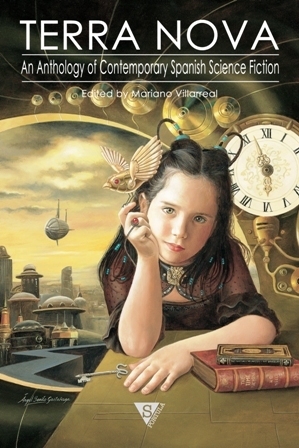Sue Burke's Blog, page 74
June 24, 2013
Terra Nova anthology now out

Short stories by six top Spanish-language writers have been translated into English and are now available in Terra Nova: An Anthology of Contemporary Spanish Science Fiction. I’m one of the translators. You can buy it at:
Smashwords, in a variety of electronic formats:
https://www.smashwords.com/books/view/328358
Amazon, in Kindle format:
http://www.amazon.com/dp/B00DJVMBHC
Amazon, in paperback:
http://www.amazon.com/dp/8494127489/
Sportula, the Spanish publisher:
http://www.sportularium.com/?p=2336
The variety of stories is impressive.
Contents
“The Texture of Words,” by Felicidad Martínez: women seek to lead despite being blind and dependent, while men fight constant wars.
“Deirdre,” by Lola Robles: in the future, robotics can create made-to-order lovers.
“Greetings from a Zombie Nation,” by Eric J. Mota: a stagnant society, Cuba, turns its citizens into the living dead.
“Light a Lone Candle,” by Victor Conde: social networks want too much and never let go.
“Bodies,” by Juanfran Jiménez: in a globalized and pseudodemocratic Europe, the rich practice sex tourism by means of mind exchange.
“Memory,” by Teresa P. Mira de Echeverría: personal relationships and sex roles evolve in radical ways on a terraformed Mars.
And an article by the editor:
“Science Fiction from Spain,” by Mariano Villarreal: a close look at the past and present in Spanish science fiction.
It’s been a pleasure to translate these outstanding stories and bring them to the English-speaking public. Get your copy today!
— Sue Burke
June 19, 2013
Go Ahead — Write This Story: Epistolary
Stories told in epistolary fashion — as letters — enjoyed popularity in the 18th century because of their realistic elements. Then they fell out of favor, but they never faded away entirely. These days, we tend to write few letters in real life, but we write lots of email, tweets, instant messages, Facebook posts, and even battling blog posts and comments. These are being used to tell whole or parts of stories or novels, sometimes interspersed with traditional narrative, transcripts from broadcast media, diary entries, news clips, artwork, and conventional letters. If you want to write an epistolary story with one, two, or several “writers,” here are some ideas:
• This is a science fiction story in which a self-aware psychotherapist and second-generation Moon resident faces her longing to visit Earth despite its deadly high gravity, corresponding with her imaginary self during a visit “home.”
• This is a thriller about a sample of contagion sent to several labs to speed up work on a vaccine, but it falls into the wrong hands, which is revealed in a series of emails.
• This is a story told as messages between two friends as they witness an outbreak of demonic possession from different locations with different outcomes.
— Sue Burke
June 14, 2013
14 - 06 - 13
declaration of songbirds
my territory
-- Sue Burke
June 12, 2013
Dangerous food

According to a study by the Medical College of Malaga, Spain, each year about 57,000 accidents take place while cutting Spain’s famous jamón, dry-cured whole-leg ham.
I usually buy mine pre-cut by experts to assure both quality and personal safety.
More about jamón in English:
http://en.wikipedia.org/wiki/Jamón
and Spanish:
http://es.wikipedia.org/wiki/Jamón_de_España
— Sue Burke
June 5, 2013
Teaching and acting: a lot in common

I’m a bad actor and I know it, but I know a few things about acting. I don’t know if I’m a good teacher, but I think teaching is a lot like acting — especially teaching English as a second language.
In a classroom, the teacher is the star: always “on,” always performing. You don’t have to be an extrovert, but if not, you have to be able to put on another personality like an actor.
Study your lines if you’re an actor. Plan your class if you’re a teacher.
Release your inhibitions on stage or in front of the camera: the audience isn’t seeing you, they’re seeing your character. And your students are seeing your lesson, not you, provided you’ve planned a compelling lesson and are teaching it attentively. Otherwise, they’re still not seeing you, they’re daydreaming about who knows what.
Project your voice on stage. In the classroom, too: a teacher must learn to use a “teacher voice.”
Enunciate and speak a little slowly as an actor. Likewise as a teacher, particularly when you’re teaching English as a second language. Speak clearly and slowly enough, which may be very very slowly, with each consonant pronounced and a little pause between each word.
Stay in character if you’re an actor. Stay at the student level if you’re teaching English. Be sure to use vocabulary the students know, and just like an actor, your gestures and body language can reinforce what you need to get across. Every gesture and word counts — that’s why both acting and teaching can be exhausting work.
Emote if you’re an actor, which means controlling what you do and how you do it to transmit the emotion. If you’re a teacher, control yourself, too. You can have fun: nothing is better than getting students to laugh (appropriately). But never get angry because that’s a loss of control. Especially if you teach adolescents, you always want to emote control, a tricky emotion that is sometimes best conveyed by a confident smile.
Finally, don’t rush. The audience needs time to react. The students need time to think. My students say I’m patient. That’s part of the act. It seems to have played well.
— Sue Burke
Also posted at my professional website,
May 29, 2013
Animals in Spanish

besugo: red bream. Also an idiot.
lince: lynx. Also someone especially shrewd or sharp-witted.
zorro: male fox. Also a sly or crafty person.
zorra: female fox. Also a whore.
avispado, avispada: wasp-like. Sharp or bright, as in person who has wised up.
pulpo en un garaje: octopus in a garage. To be lost or disoriented about something.
borrico, borrica: donkey. Also a really stupid person, especially a dumb student.
canguro: kangaroo. Also a babysitter.
— Sue Burke
May 19, 2013
Open Mic in Madrid

The Tenth Mad Open Mic: Captured Words will be held at 9 p.m. Wednesday, May 22, upstairs at Librería Fuentetaja, calle San Bernardo 35, Madrid.
More than thirty people will perform. Free admission. Come and enjoy! I’ll be presenting the short-short story “Dogs in Heaven.”
— Sue Burke
Me? A Hitchhiker?
Now if only I were half as funny as he was...
 I write like
I write likeDouglas Adams
I Write Like by Mémoires, journal software. Analyze your writing!
May 15, 2013
Go Ahead — Write This Story: Anger
For a good story, characters must have emotions. Anger, for example. But how to show this? With people suddenly fighting or shouting? This doesn’t tell us much about their anger. Instead (among other creative ways) you might show the character’s journey from frustration to self-blame to anger, or from fear to hatred to furor, or from irritation to exasperation to outrage. If you need an angry story idea, here are a few:
• This is an end-of-civilization story in which Earth respects its own sacred sites but unintentionally defiles a site sacred to extraterrestrials.
• This is a heroic high fantasy novel that takes place during a hostage situation in which a would-be rescuer must defy the theory of gravity to gain access to a floating city.
• This is an alternate history horror story in which the banshees repel a Nazi invasion of Ireland.
— Sue Burke
May 3, 2013
Qualified translator
-- Sue Burke



